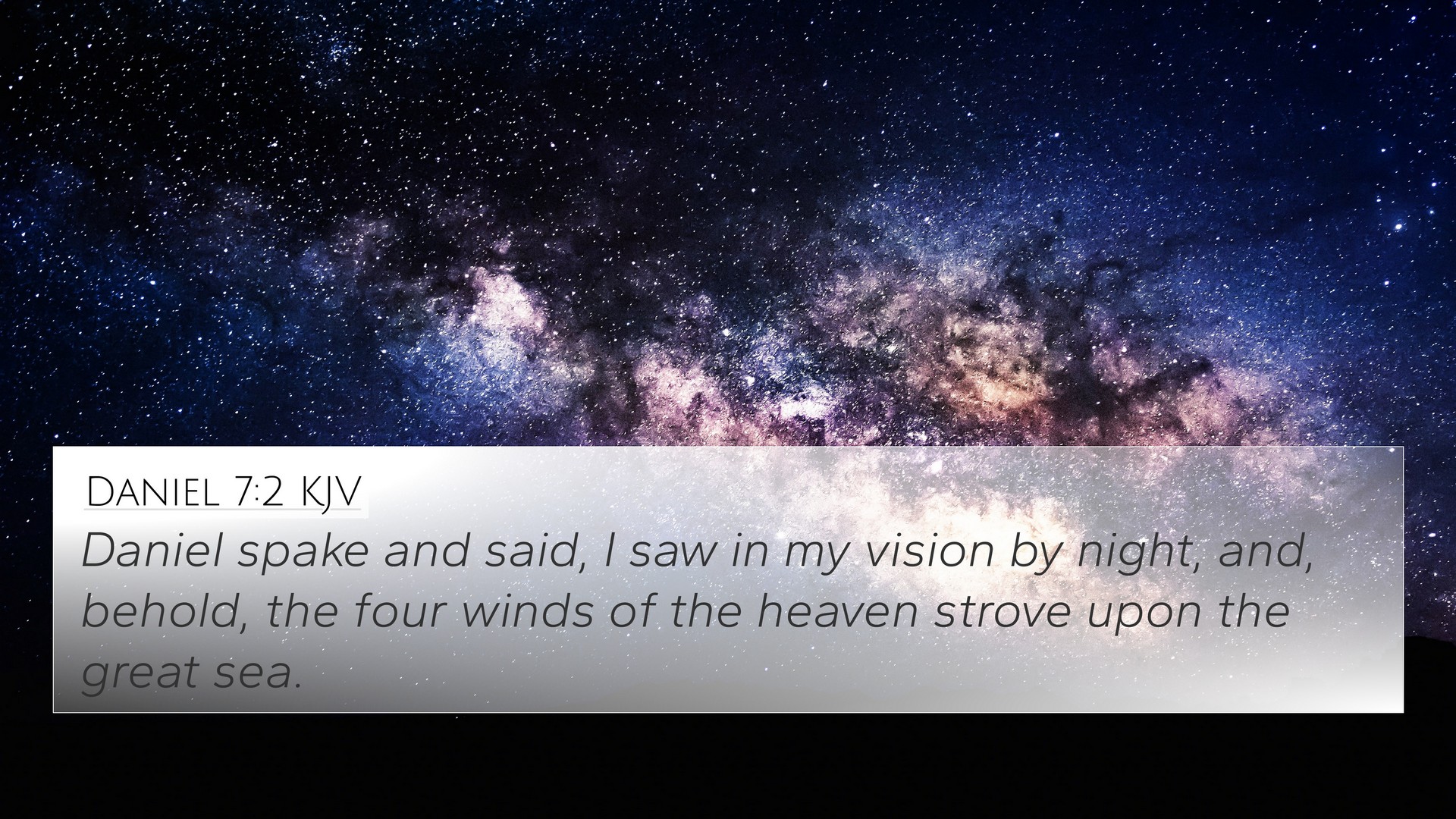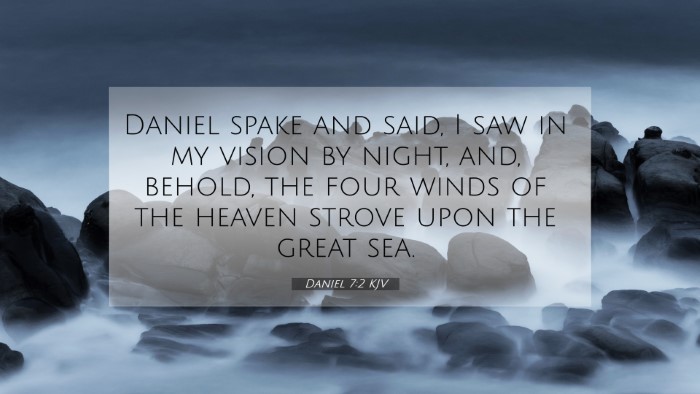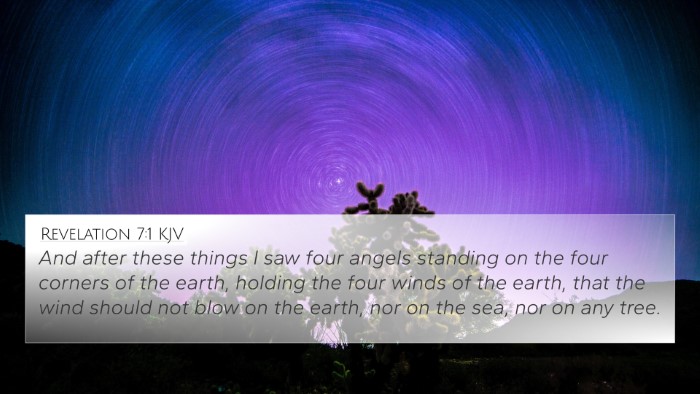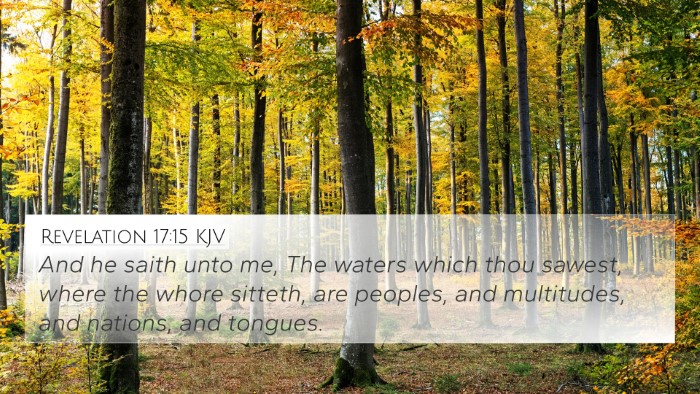Understanding Daniel 7:2
Bible Verse: Daniel 7:2 - "Daniel spoke, saying, 'I saw in my vision by night, and behold, the four winds of heaven were stirring up the Great Sea.'"
Summary of Meaning
This verse serves as an introduction to a significant prophetic vision experienced by the prophet Daniel. The imagery used here, particularly the 'four winds' and 'Great Sea,' symbolizes a moment of divine revelation where the chaos and turmoil among nations are made manifest. The winds represent strength and power, indicating that the forces of heaven are at work, stirring up the waters of earthly kingdoms.
Commentary Insights
-
Matthew Henry:
Henry emphasizes the emotional aspect of visions, noting that they often cause awe and fear. He points to the Great Sea as a representation of the tumultuous state of the world, subject to the will of God and influenced by spiritual forces.
-
Albert Barnes:
Barnes interprets the 'four winds' as emblems of the various kingdoms and empires that will rise and fall throughout history. Each wind exemplifies different political powers stirring chaos within nations, aligning with the prophetic nature of the visions Daniel receives.
-
Adam Clarke:
Clarke describes the 'Great Sea' symbolically as representing the vast and turbulent masses of humanity, where the adversities faced by the people are brought to light through divine intervention. He notes the significance of the 'four winds' as the forces that precede the active providence and judgments of God.
Bible Cross-References
This verse is interconnected with various other scriptures that enhance its meaning and context.
- Revelation 7:1: "After this, I saw four angels standing at the four corners of the earth, holding back the four winds of the earth..." - Similar imagery of four winds as divine forces.
- Matthew 14:24: "But the boat was already a long distance from the land, battered by the waves; for the wind was contrary." - Illustrates trouble at sea reminiscent of the Great Sea's turmoil.
- Isaiah 27:8: "In measure, when it shoots forth, you will debate with it; He stays His rough wind in the day of the east wind." - A direct link to the control of winds and their impact on experience.
- Revelation 17:15: "And he said to me, 'The waters which you saw, where the harlot sits, are peoples and multitudes and nations and tongues.'" - Further elaboration on 'waters' symbolizing humanity and chaos.
- 2 Peter 3:10: "But the day of the Lord will come like a thief, in which the heavens will pass away with a roar and the elements will be destroyed with intense heat..." - God's divine authority over the natural elements.
- Jeremiah 51:42: "The sea has come up over Babylon; she is covered with the tumult of its waves." - A prophetic connection tying tumultuous waters to judgement on nations.
- Psalm 93:3-4: "The floods have lifted up, O Lord, the floods have lifted up their voice; the floods lift up their waves." - Divine sovereignty amidst chaos in nature.
Thematic Connections
Thematically, Daniel 7:2 connects to broader Biblical narratives about God's sovereignty over nations and recognition of prophetic visions. The following themes resonate through this verse:
- Divine Sovereignty: The imagery of winds and seas illustrates God's control over natural and political tumult.
- Visions and Prophecies: A common motif in scripture where God reveals future events through dreams and visions.
- Chaos and Order: Represents the tumultuous state of worldly affairs that God can bring to order.
Conclusion
Daniel 7:2 opens a window into an intricate world of prophetic revelation, emphasizing the great power of divine forces in shaping history and among nations. It invites readers to explore the connections between scripture that reveal God's overarching plan and interactions with humanity throughout ages.
For those studying the Bible, leveraging cross-references enhances understanding through a comprehensive exploration of how verses connect thematically and contextually. The insights provided by historical commentaries help deepen one’s grasp of these profound texts.




